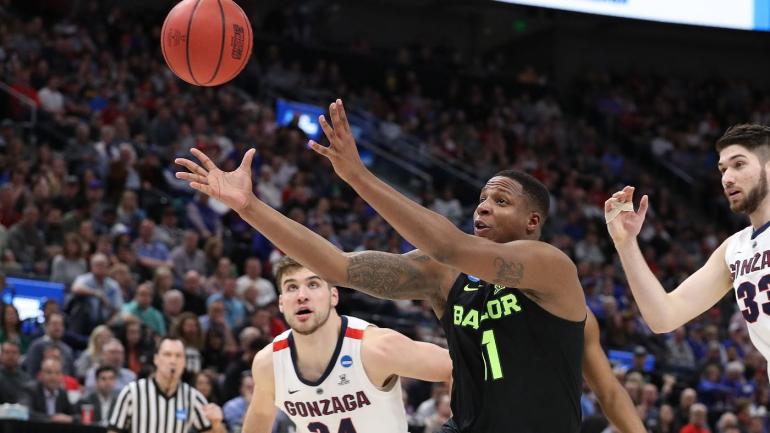
Gonzaga is No. 1 in the CBS Sports Top 25 And 1. And Baylor is No. 2. It's an uncommon couple atop the polls heading into an uncommon -- well, unprecedented -- season.
But do you realize what these programs are doing? To this point, here's what the nonconference schedules are looking like for the two Final Four contenders.
For Gonzaga:
- vs. No. 11 Michigan State (potentially) in Orlando in late November
- vs. No. 12 Tennessee in Orlando on Dec. 2
- vs. No. 2 Baylor in Indianapolis on Dec. 5
- vs. No. 5 Iowa in South Dakota on Dec. 19
For Baylor:
- vs. No. 25 Arizona State in Connecticut on Nov. 25
- vs. No. 3 Villanova (potentially) in Connecticut on Nov. 26
- at Seton Hall on Nov. 29
- vs. a good team -- I'm told it could be No. 6 Illinois -- in Orlando Dec. 2
- vs. No. 1 Gonzaga in Indianapolis on Dec. 5
Keep in mind there will be more games against NCAA Tournament-level teams for both schools when they squeeze in additional tilts in Orlando, where ESPN is going to house dozens of teams and numerous multi-team events. Mark Few and Scott Drew, two coaches who've never won a national title and only one of whom has made a Final Four, are scheduling like degree of difficulty will get them to the promised land.
I love it. Can you imagine if college basketball always had this? By that I mean: regularly had two of its top three or four teams not only explicitly seeking each other out to play in the nonconference, but also were borderline obsessed with playing the hardest out-of-league slate possible? It's what the 2020-21 season has delivered with the Bulldogs and Bears.
These two aren't the only top 10-caliber teams seeking difficult schedules, I know. Expect Kansas to be very rugged again, for instance. No. 4 Virginia is targeting to play Florida, and should also have No. 3 Villanova on the schedule. No. 5 Iowa told Gonzaga it's totally up for a throwdown in South Dakota. It's a fabulous thing for college basketball. If all teams in the top five or 10 were as aspirational as Gonzaga and Baylor are this year, college basketball would never again have to worry about its November and December relevance.
If we can start the season on Nov. 25 and be fortunate enough to have minimal postponements or cancellations, thanks to hundreds of games being played in controlled environments, the first two weeks will be adorned with top-25 matchups practically daily. On top of that, we'll have Gonzaga and Baylor, battling for the top of the polls, loading up and leaning into it all. It would be easy, if not understandable, to see Few and Drew seek to lay out a bit, merely schedule acceptably, and then head into league play and look to dominate and use that as an avenue to a top seed. Instead, each coach is scheduling ranked teams like this will be the last season they'll ever get to face them.
Let's peel back another layer. It's also a smart strategy because of the anticipated fragile nature of college basketball's season. Schools that play in a multi-team event can have a maximum of 27 games. I've yet to speak to one coach who thinks any team is getting in 27 games this season. There will be X-outs. So with that in mind, it makes sense for GU and BU to load up on the big boys and have multiple options just in case one or two upper-echelon Quad 1 games (the toughest type of game, by designation in the NCAA's NET rankings) wind up getting wiped out.
Let me assure you this: there is no shortage of major-conference coaches who are right now looking to reduce their level of difficulty in the noncon. In certain circumstances, that's understandable. But there are also schools in Gary Parrish's Top 25 And 1 that have deliberately made sure to ease up their slates. There are coaches that want the easy wins as often as they can get them.
So credit to Few and Drew. It's going to inevitably lead to losses and because of that, each team is probably going to be in jeopardy of holding the No. 1 spot in the rankings for multiple weeks in November and December. But that stuff doesn't matter as much as getting in as many good games as possible in what will be a unique season. It's scheduling prudence. It's coronavirus insurance.
Behind the scenes, there's been a lot of anxiety and lamenting from coaching staffs over what hasn't been possible with getting games arranged to this point. The NCAA this week even debated changing the rules on scheduling before opting not to invite even more chaos. Gonzaga and Baylor never had to worry about this because they didn't put parameters on their games. They, and a couple other really good teams, have shouldered it as a responsibility to themselves and college hoops to play an abundance of meaningful games in a shortened season.
And when there is a 2021 NCAA Tournament and the seeds have to be figured out, I think that's when everyone's going to realize that Drew and Few understood how beneficial it would be to load up in the first month of the season, so just in case the second and third month of the season fray in a hundred directions, they'll have no shortage of reference points for why they deserve strong consideration for top seeds.

















